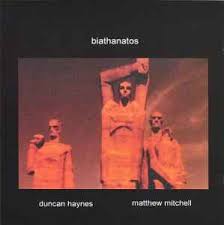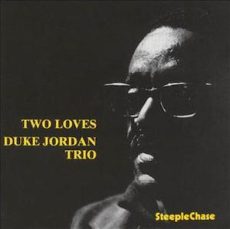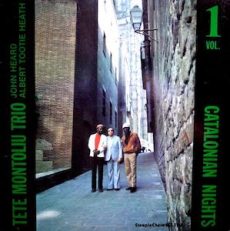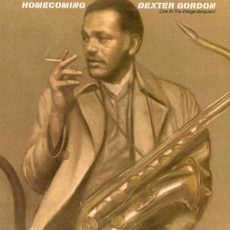
Daily Dose Of Jazz…
Matthew Mitchell was born in Hamilton, New Zealand on August 9, 1973 and didn’t start studying jazz until late in his teens, beginning on guitar at the age of 17. Four years later he attended what became the Massey University Wellington School of Music majoring in jazz. By 1998 he became a member of the New Zealand Youth Jazz Orchestra and toured with ex-Buddy Rich trumpeter John Hoffman.
First achieving prominence on the New Zealand jazz scene the following year when he won the Wellington Fringe Festival Music Award. His study of Indian classical music produced cohesive results and Matthew toured the country with Master Tabla drummer Dr. Tarlochan Singh from Delhi, India and then with New York vibraphonist Arthur Lipner. He then put together his own trio featuring Paul Dyne and Rick Cranson and they released two CDs, one of which was a big band work.
Moving to London, England in 2000 he continued work with his trio and rapidly became a prominent member of the jazz scene and joined Byron Wallen’s As Is project touring the UK and performing at a number of international festivals. He went on to perform and tour with German saxophonist Ingrid Laubrock, as well as Japanese electronic music artists Takagi Masakatsu and Ogorusu Norihide and with countryman electronics artist Signer.
Guitarist Mattewh Mitchell continues to tour regularly throughout Europe with his own groups and release recordings.
More Posts: bandleader,guitar,history,instrumental,jazz,music

Requisites
Two Loves is an album led by pianist Duke Jordan recorded on November 25th and December 2, 1973, at Sound Track in Copenhagen, Denmark. My Old Flame, Wait And See, and I’ll Remember April was recorded during the December session. The album was released the following year in 1974 on the Danish label, SteepleChase.
The producer was Nils Winther, the engineer was Ole Hansen, the liner notes were written by Roland Baggenæs and the photography, design, and cover was taken and created by Lissa Winther.
A bebopper of the first generation, this album is evidence of Jordan’s gentle touch, his simply constructed chords, and his preference for medium tempos.
Track List | 40:55 ~ 62:27 with CD Bonus Tracks-
- Subway Inn – 8:11
- My Old Flame (Sam Coslow, Arthur Johnston) – 8:45
- Blue Monk (Thelonious Monk) – 5:14
- Two Loves – 3:05
- Embraceable You (George Gershwin, Ira Gershwin) – 7:15
- Wait And See – 2:44
- I’ll Remember April (Gene de Paul, Patricia Johnston, Don Raye) – 5:34
- Lady Dingbat – 4:08
- Jordu – 5:19
- Duke Jordan – piano
- Mads Vinding – bass
- Ed Thigpen – drums
More Posts: choice,classic,collectible,collector,history,instrumental,jazz,music,piano

Daily Dose Of Jazz…
Petra Van Nuis was born in Cincinnati, Ohio on August 1, 1975. Her initial exposure to music came from her father who was a classical pianist. She made her professional debut at the age of eleven with the Cincinnati Opera Company and the following year her first national tour was underway.
Middle and high school saw her attending Cincinnati’s School for the Creative and Performing Arts and continued summer studies at New York City Ballet’s School of American Ballet and San Francisco Ballet School. Van Nuis went on to get her BFA in Musical Theater from the University of Cincinnati’s College~Conservatory of Music. She then performed in regional theaters and national tours until 1999 when she hung up her dancing shoes to sing.
Entering the world of jazz singing she spent nights in her hometown listening to vocalists Ann Chamberlain and Mary Ellen Tanner who supported her early efforts. By 2001 she and husband, guitarist Andy Brown, moved to New York City where she met Marion Cowings and Barbara Lea. Two years later she’s in Chicago, Illinois under the wings of Jeannie Lambert, Judy Roberts and Marc Pompe who mentored her. Forming her own band she sings at all the major venues and festivals around the city.
Vocalist Petra van Nuis, who has five Japanese released CDs, continues to perform, record and tour nationally and internationally.
More Posts: bandleader,history,instrumental,jazz,music,vocal

Requisites
Catalonian Nights, Vol. 1 ~ Tete Montoliu Trio | By Eddie Carter
The Tete Montoliu Trio enters the spotlight with a 1980 live trio date, Catalonian Nights, Vol. 1 (SteepleChase Records SCS-1148). It came out a year later and is the first of three releases by the group from the Zeleste Club. Tete was born blind in Barcelona and learned braille music at age seven. His father was a professional musician, and his mother loved jazz, inspiring him to learn the piano. Montoliu attended the Barcelona Conservatori Superior de Música del Liceu at age thirteen. Tete met a few jazz musicians and learned about jam sessions while studying at the music college. He’s joined here by John Heard on bass and Albert Tootie Heath on drums. My copy is the original U.S. Stereo album.
D & E is from the pen of Milt Jackson and gets the set underway with the trio’s medium melody. Everyone has a lengthy canvas to work on, and Tete lets his fingers do the talking on the lead interpretation. John follows, walking his bass as if on a Sunday stroll, then Albert converses with Tete ahead of the close. Montoliu showcases his swinging style on Lady Bird by Tadd Dameron next, beginning with a solo introduction that grows into the ensemble’s spirited melody. Tete’s opening solo is off to an adventurous start; then Heath joins the pianist for a vigorous exchange leading to the theme’s reprise and robust ending.
Autumn In New York by Vernon Duke begins with a beautiful piano introduction that blossoms into a gorgeous ensemble theme. Tete begins the opening statement quietly, then picks up the pace to improvise freely into a satisfying summation. John delivers the following solo with exquisite sensitivity, preceding the closing chorus and tender climax. Kenny Dorham’s Blue Bossa takes off with the trio’s bossa-nova melody. Montoliu makes his entrance with an intriguing interpretation that delivers the goods. Heard speaks his piece next, then Tete and Heath share the finale leading to the melody’s reprise and exit. The trio wraps everything up in short order with The Theme.
Freddy Hansson and Josep Maria Rodon recorded this live performance, and Nils Winther produced it. Catalonian Nights, Vol. 1, is an excellent recording with a superb soundstage that makes listeners feel like they are in the club audience as the trio performs. I first heard The Tete Montoliu Trio on Gentle Ben with Ben Webster and was immediately impressed by his playing. Now that I’ve discovered this album, I’ll be on the lookout for Catalonian Nights, Vol. 2 and Vol. 3. If you’re in the mood for an excellent live album, I offer for your consideration Catalonian Nights, Vol. 1 by The Tete Montoliu Trio. It’s a great release that I highly recommend and a welcome addition to any library!
~ Catalonian Nights, Vol 2 (SteepleChase Records SCS 1241), Catalonian Nights, Vol. 3 (SteepleChase SCCD 31433), Gentle Ben (Ensayo ENY-301) – Source: Discogs.com ~ Autumn In New York – Source: JazzStandards.com ~ Blue Bossa, Lady Bird – Source: Wikipedia.org © 2023 by Edward Thomas Carter
More Posts: choice,classic,collectible,collector,history,instrumental,jazz,music,piano

Requisites
Homecoming – Live at The Village Vanguard ~ Dexter Gordon | By Eddie Carter
I’ve been a Dexter Gordon fan since childhood and saw him perform in an all-star jam session at The 1972 Newport Jazz Festival. In 1976, he returned to the US for an engagement at The Village Vanguard. Dexter received a warm welcome upon his arrival and played to sold-out crowds each night. This morning’s album from the library, Homecoming (Columbia PG 34650), finds Dexter effectively demonstrating he was still a master on the tenor sax. His bandmates on this live date are Woody Shaw on flugelhorn (tracks: A2, D1) and trumpet (A1, B1, B2, C1, C2, D2), Ronnie Matthews on acoustic piano, Stafford James on acoustic bass, and Louis Hayes on drums. My copy is the 1977 US Stereo release.
The album opens with Gingerbread Boy by Jimmy Heath. The front line leads the ensemble in a lively melody. Dexter is off to an adventurous start on the opening solo. Woody and Louis share the spotlight in the following reading; first, in a vigorous exchange; next, Woody takes the reins. Ronnie follows with an exciting closing statement ahead of the reprise. Gordon introduces Woody Shaw’s Little Red Fantasy, a dedication to his wife and manager, Maxine Gregg opens with the ensemble’s attractive melody. Gordon begins the opening solo affectionately, then gradually increases the intensity as it unfolds. Shaw comes behind him with a beautiful performance, then Matthews moves into the third reading elegantly. James walks the bass confidently until the ensemble’s delicate ending.
Fenja, Dexter Gordon’s touching tribute to his wife, begins Side Two with the quintet’s medium theme. Dexter takes the first solo at an easy swing, then builds to a happy groove. Woody adds a bit of home cooking in the following interpretation. Ronnie emerges next for a relaxing reading one can almost dance to, and Stafford eases into a delightfully personal statement preceding the ensemble’s closing chorus. In Case You Haven’t Heard by Woody Shaw picks up the pace for the rhythm section’s introduction and quintet’s melody. Gordon is up first with a lively interpretation; then Shaw engages in a vigorous conversation with Hayes. Matthews has the last spot and dispenses vibrant notes into the melody reprise and ending.
Side Three starts with It’s You Or No One by Sammy Cahn and Jule Styne. The saxophonist opens with an energetic introduction, succeeded by the quintet’s spirited melody. Dexter swings hard on the first solo. Woody comes in next for an enthusiastic romp, then Ronnie responds with a passionate improvisation. Louis provides a memorable exclamation point preceding a vibrant closing chorus. Let’s Get Down by Ronnie Matthews begins with his introduction segueing into the group’s peppy theme. Gordon kicks off the solos with an inspired improvisation; Shaw has much to say in the following statement. Matthews settles in for some straight-ahead swinging next, then James’ bass walks smoothly. Both horns share the finale with Louis before the quintet takes the song out.
‘Round Midnight is Thelonious Monk’s best-known and most recorded composition. It opens Side Four with Ronnie’s gentle introduction; then Dexter comes in for the tender theme, accented by Woody’s comments. Dexter continues with a delicately pretty opening solo. Woody delights with velvet smoothness in the following reading. Ronnie shows expressive artistry in the next statement. Dexter provides a final comment ahead of the ensemble’s summation. The rhythm section opens Dexter’s Backstairs with a brisk introduction to the quintet’s quick melody. Gordon gives the opening solo an energetic workout; then Shaw delivers a passionate intensity in the second statement. Matthews raises the temperature in a quick finale leading to the quintet’s climax, and Dex thanking the audience.
Michael Cuscuna produced Homecoming, and Malcolm Addey recorded it. The album has a splendid soundstage that transports the listener to the Village Vanguard’s intimacy as the musicians perform. If you’re a Dexter Gordon fan and are in the mood for an excellent live quintet date, I invite you to consider Homecoming for a spot in your library. It’s a jazz time capsule with many magical moments that not only rewards those in attendance but allows the listener to enjoy these outstanding performances each time it’s on the turntable!
~ Round Midnight – Source: JazzStandards.com © 2023 by Edward Thomas Carter
More Posts: choice,classic,collectible,collector,history,instrumental,jazz,music,saxophone



